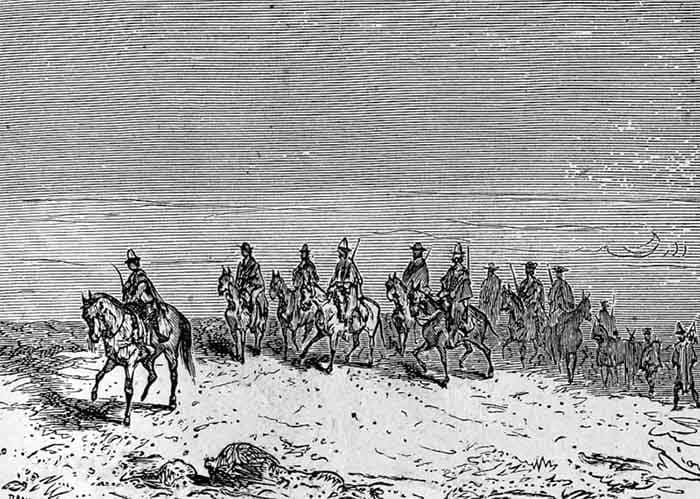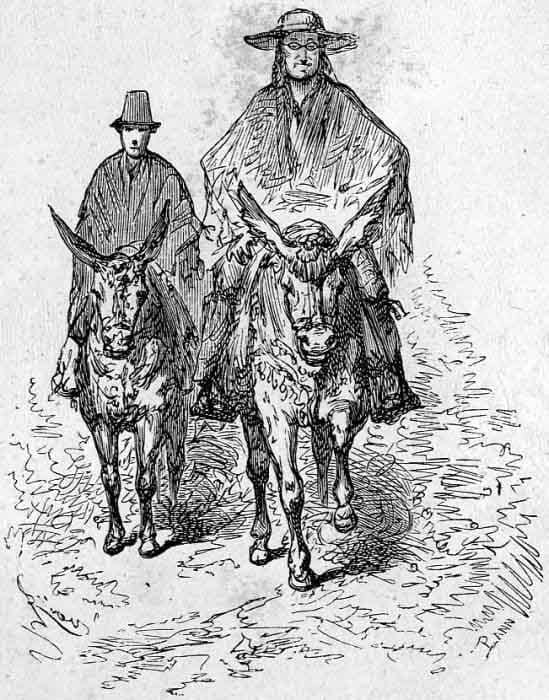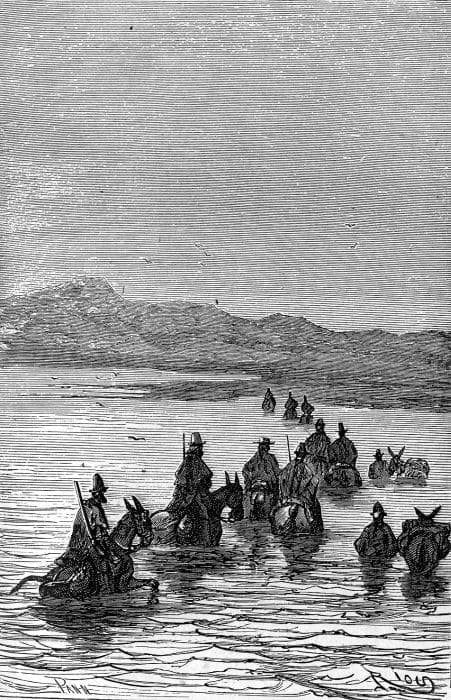CHAPTER XI.
TRAVELING IN CHILI.
The native troop engaged by Glenarvan consisted of three men and a boy. The leader of the muleteers was an Englishman who had lived in the country for twenty years. His occupation was to let mules to travelers, and guide them across the passes of the Andes. Then he consigned them to the care of a “laqueano” (Argentine guide), who was familiar with the road over the Pampas.
This Englishman had not so forgotten his native tongue, in the company of mules and Indians, that he could not converse with the travelers. Hence it was easy for Glenarvan to make known his wishes, and for the muleteer to execute his orders, of which circumstance the former availed himself, since Paganel had not yet succeeded in making himself understood.
This leader, or “catapaz,” in the language of Chili, was assisted by two native peons and a boy of twelve. The peons had charge of the mules laden with the baggage of the party, and the boy led the madrina (little mare), which wore small bells, and went in advance of the other ten mules. The travelers were mounted on seven, and the catapaz on one, of these animals, while the two others carried the provisions and a few rolls of cloth designed to insure the good-will of the chiefs of the plains. The peons traveled on foot according to their custom. This journey in South America was, therefore, to be performed under the most favorable conditions of safety and speed.

Crossing the Andes is not an ordinary journey. It cannot be undertaken without employing those hardy mules, of which the most preferable belong to the Argentine Republic. These excellent animals have attained in that country a development superior to their pristine quality and strength. They are not very particular about their food, drink only once a day, and easily make ten leagues in eight hours.
There are no taverns on this route, from one ocean to the other. You eat dried meat, rice seasoned with allspice, and whatever game can be captured on the way. In the mountains the torrents, and in the plains the rivers, furnish water, generally flavored with a few drops of rum, of which each has a supply in an ox-horn called “chiffle.” However, care must be taken not to indulge too much in alcoholic drinks, which are specially injurious in a region where the nervous system is peculiarly excited.
As for your bedding, it consists merely of the native saddle called “recado.” This saddle is made of sheep-skins tanned on one side and covered with wool on the other, and is supported by broad girths elaborately embroidered. A traveler wrapped in one of these warm coverings can brave with impunity the dampness of the nights, and enjoy the soundest repose.
Glenarvan, who knew how to travel and conform to the customs of different countries, had adopted the Chilian costume for himself and his friends. Paganel and Robert, two children (a large and a small one), felt no pleasure in introducing their heads into the national poncho (a large blanket with a hole in the centre), and their legs into leathern stirrups. They would rather have seen their mules richly caparisoned, with the Arab bit in their mouths, a long bridle of braided leather for a whip, and their heads adorned with metal ornaments and the “alforjas” (double saddle-bags containing the provisions).
Paganel, always absent-minded, received three or four kicks from his excellent animal just as he was mounting. Once in the saddle, however, with his inseparable telescope in a sling and his feet confined in the stirrups, he confided himself to the sagacity of his beast, and had no reason to repent. As for young Robert, he showed from the first a remarkable capacity for becoming an excellent horseman.

They started. The day was magnificent, the sky was perfectly clear, and the atmosphere sufficiently refreshed by the sea-breezes in spite of the heat of the sun. The little party followed at a rapid pace the winding shores of the bay, and made good progress the first day across the reeds of old dried marshes. Little was said. The parting farewells had left a deep impression upon the minds of all. They could still see the smoke of the Duncan as she gradually disappeared on the horizon. All were silent, except Paganel; this studious geographer kept asking himself questions, and answering them, in his new language.
The catapaz was, moreover, quite a taciturn man, whose avocation had not made him loquacious. He scarcely spoke to his peons, for they understood their duty very well. Whenever a mule stopped, they urged him with a guttural cry. If this did not suffice, a good pebble thrown with sure aim overcame his obstinacy. If a girth gave way or a bridle was loosened, the peon, taking off his poncho, enveloped the head of the animal, which, when the injury was repaired, resumed its pace.
The custom of the muleteers is to set out at eight o’clock in the morning after breakfast, and travel thus till it is time to rest at four o’clock in the afternoon. Glenarvan, accordingly, conformed to this custom. Precisely when the signal to halt was given by the catapaz, the travelers arrived at the city of Arauco, situated at the southern extremity of the bay, without having left the foam-washed shore of the ocean. They would have had to proceed twenty miles farther to the west to reach the limits of the thirty-seventh parallel; but Glenarvan’s agents had already traversed that part of the coast without meeting with any signs of shipwreck. A new exploration became, therefore, useless, and it was decided that the city of Arauco should be chosen as their point of departure. From this their course was to be directed towards the east in a rigorously straight line. The little party entered the city and took up their quarters in the open court of a tavern, whose accommodations were still in a rudimentary state.
While supper was preparing, Glenarvan, Paganel and the catapaz took a walk among the thatch-roofed houses. Except a church and the remains of a convent of Franciscans, Arauco presented nothing interesting. Glenarvan attempted to make some inquiries, but failed, while Paganel was in despair at not being able to make himself understood by the inhabitants. But, since they spoke Araucanian, his Spanish served him as little as Hebrew.
The next day, the madrina at the head, and the peons in the rear, the little troop resumed the line of the thirty-seventh parallel towards the east. They now crossed the fertile territory of Araucania, rich in vineyards and flocks. But gradually solitude ensued. Scarcely, from mile to mile, was there a hut of “rastreadores” (Indian horse-tamers). Now and then they came upon an abandoned relay-station, that only served as a shelter to some wanderer on the plains; and, by means of a ford, they crossed the Rio Tubal, the mountains visible in the distance.
At four o’clock in the afternoon, after a journey of thirty-five miles, they halted in the open country under a group of giant myrtles. The mules were unharnessed, and left to graze at will upon the rich herbage of the prairie. The saddle-bags furnished the usual meat and rice, the pelions spread on the ground served as covering, the saddles as pillows, and each one found on these improvised beds a ready repose, while the peons and the catapaz watched in turn.
As the weather continued pleasant, all the travelers, not excepting Robert, were still in good health; and, since the journey had begun under such favorable auspices, they thought it best to profit by it, and push on. The following day they advanced rapidly, crossed without accident Bell Rapids, and at evening encamped on the banks of the Rio Biobio. There were thirty-five miles more to travel before they were out of Chili.
The country had not changed. It was still rich in amaryllis, violets, date-trees, and golden-flowered cactuses. A few animals, among others the ocelot, inhabited the thickets. A heron, a solitary owl, thrushes and snipes wary of the talons of the hawk, were the only representatives of the feathered tribe.
Of the natives few were seen; only some “guassos” (degenerate children of the Indians and Spanish), galloping on horses which they lacerated with the gigantic spurs that adorned their naked feet, and passing like shadows. They met on the way no one who could inform them, and inquiries were therefore utterly impossible.
Glenarvan thought that Captain Grant, if prisoner of the Indians, must have been carried by them beyond the Andes. Their search could be successful only in the Pampas. They must be patient, and travel on swiftly and continuously.

They advanced in the same order as before, which Robert with difficulty kept, for his eagerness led him to press forward, to the great annoyance of his animal. Nothing but a command from Glenarvan would keep the young boy at his place in the line. The country now became more uneven; and several hillocks indicated that they were approaching the mountains.
Paganel still continued his study of Spanish.
“What a language it is!” exclaimed he; “so full and sonorous!”
“But you are making progress, of course?” replied Glenarvan.
“Certainly, my dear lord. Ah! if there were only no accent! But, alas! there is one!”
In studying this language, Paganel did not, however, neglect his geographical observations. In these, indeed, he was astonishingly clever, and could not have found his superior. When Glenarvan questioned the catapaz about some peculiarity of the country, his learned companion would always anticipate the answer of the guide, who then gazed at him with a look of amazement.
That same day they met a road which crossed the line that they had hitherto pursued. Lord Glenarvan naturally asked its name of their guide, and Paganel as naturally answered,—
“The road from Yumbel to Los Angelos.”
Glenarvan looked at the catapaz.
“Exactly,” replied he.
Then, addressing the geographer, he said,—
“You have traveled in this country?”
“Certainly,” replied Paganel gravely.
“On a mule?”
“No; in an arm-chair.”
The catapaz did not understand, for he shrugged his shoulders and returned to the head of the troop.
At five o’clock in the afternoon they stopped in a shallow gorge, a few miles above the little town of Loja; and that night the travelers encamped at the foot of the first slopes of the Andes.

